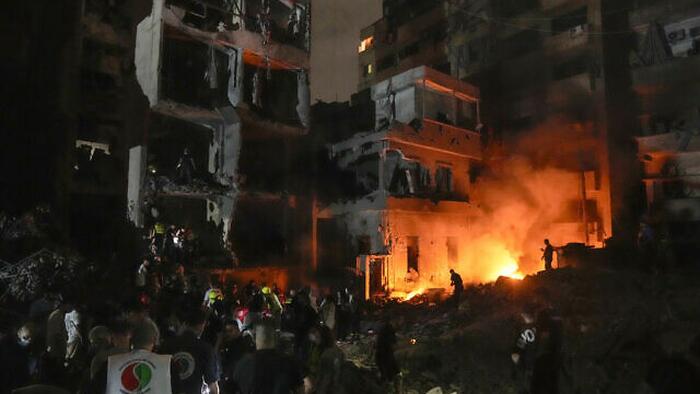On Thursday, a significant Israeli airstrike targeted central Beirut, aiming to assassinate senior Hezbollah official Wafiq Safa, who oversees internal security for the group. The airstrikes focused on the Ras al Nabaa district, marking the first serious assault on central Beirut amidst nearly two weeks of consistent Israeli strikes on Hezbollah strongholds in southern Beirut. While Israel claimed its intent was to eliminate Safa, the residential area targeted included apartment buildings and small businesses, resulting in significant civilian casualties. Lebanese authorities reported that at least 22 individuals were killed and 117 were injured in this strike, making it the deadliest incident in the capital since the onset of the recent hostilities. Among the deceased were a family of eight, two of whom were children displaced from southern Lebanon due to the ongoing violence.
Israeli media and international news outlets later confirmed that Wafiq Safa survived the attack, with reports stating he suffered serious injuries and was in critical condition. This development sparked outrage within Lebanese politics, with the country’s caretaker Prime Minister, Najib Mikati, condemning the strikes as unacceptable. He called for an immediate ceasefire, specifically noting that 139 civilians had died in total during various Israeli attacks throughout the day. Mikati’s appeal illustrated the dire humanitarian crisis unfolding in Lebanon, as he questioned the morality of continued violence and the suffering endured by innocent civilians.
However, the Lebanese government is limited in its ability to control Hezbollah, which is significantly better armed than the national army and operates with considerable autonomy. The deficiencies in the Lebanese military are exacerbated by US-led sanctions that restrict weapon supplies, leaving the government without an effective means to negotiate a ceasefire or enforce peace. Consequently, the situation is precarious, as Hezbollah continues to operate independently, complicating any government-led efforts for reconciliation or military restraint.
In retaliation for the airstrike on Beirut, Hezbollah announced that it had launched drones targeting an Israeli military base in Kiryat Eliezer, near Haifa. Moreover, they reported attacking Israeli soldiers in areas north of Haifa and shelling an IDF barracks in northern Israel. This reciprocal violence highlights the escalating tension along the Israel-Lebanon border, with casualties occurring on both sides. On the same day, Israeli reports indicated that three reservists were killed in action against Hezbollah, marking the initial notable loss of reservists since the commencement of the renewed ground offensive.
As violence continues to escalate, the humanitarian toll on both sides grows increasingly severe. In Gaza, the Health Ministry reported that 61 Palestinians were killed and 231 injured within a 24-hour period, contributing to the total death toll in the region since the conflict reignited in October 2023. The ongoing Israeli airstrikes have left an overwhelming number of casualties, with reports estimating over 42,000 fatalities in Gaza alone. Furthermore, Israeli forces have taken actions that put UN peacekeepers at risk in southern Lebanon, contributing to instability in the region.
With the situation in both Lebanon and Gaza deteriorating rapidly, global concern is mounting regarding the humanitarian implications of the continued military engagements. Calls for ceasefires and diplomatic interventions have intensified; however, the complexities of regional power dynamics and the strength of militant groups like Hezbollah challenge these efforts. Ultimately, the persistent violence threatens not only the immediate safety of civilians but also the broader stability of the region, making the international community’s role in mediating the conflict all the more critical.

